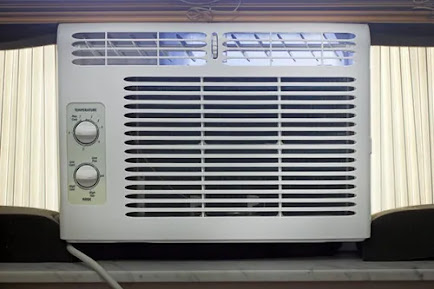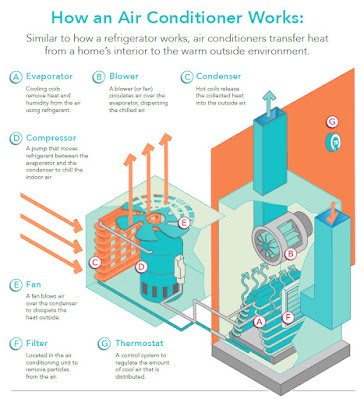TYPES OF AIR CONDITIONERS
There are several types of air conditioners available, catering to different cooling needs and installation requirements. Some common types include:
1. Window air conditioners: These are compact units that are installed in a window or a specially made opening in a wall. They are suitable for cooling individual rooms or small spaces. They typically consist of a cooling unit that sits partially outside the window or wall, while the front portion of the unit remains inside the room. Window air conditioners often come with a variety of features, including adjustable temperature settings, fan speed control, sleep mode, timer functions, and energy-saving modes.


3. Central air conditioners: These are large-scale cooling systems that are designed to cool an entire building or multiple rooms through a duct system. They use a refrigeration cycle that involves compressing and expanding a refrigerant gas to cool the air. Central air conditioners have a central compressor and condenser unit located outside the building, and the cooled air is distributed through ductwork and vents.

4. Portable air conditioners: These are self-contained units that are easy to move and suitable for cooling specific areas or rooms. Portable air conditioners typically have a venting hose that needs to be connected to a window or an opening to exhaust the hot air generated during the cooling process. Portable air conditioners work by extracting warm air from a room and cooling it before releasing it back into the space. They typically consist of four main components: a compressor, a condenser, an evaporator, and a fan. The compressor and condenser work together to cool the air, while the evaporator removes moisture from the air, reducing humidity levels.
5.Ductless mini-split air conditioners: Ductless mini-split air conditioners, also known as ductless air conditioning systems or ductless heat pumps. Similar to split air conditioners, ductless mini-splits consist of an outdoor unit and one or more indoor units. However, ductless mini-splits do not require ductwork for air distribution. They are ideal for cooling specific zones or areas in a building and are known for their energy efficiency.
6.Ceiling cassette air conditioners: These units are mounted in the ceiling, leaving only the decorative panel exposed in the room. Ceiling cassette air conditioners distribute cooled air in multiple directions, making them suitable for larger spaces or open floor plans. They require a drop ceiling or a space above the ceiling for installation, as the unit is partially embedded in the ceiling. Installation may involve cutting a hole in the ceiling and connecting the unit to the outdoor condenser via refrigerant lines and electrical wiring.
7. Packaged terminal air conditioners (PTAC): PTAC units are often found in hotels, apartments, or individual rooms. They are installed through a wall and come with both cooling and heating capabilities. PTAC units are self-contained and are commonly controlled through a built-in thermostat. They operate in a similar manner to traditional central air conditioning systems, with air being drawn in, cooled or heated, and then circulated back into the room.

Conclusion
These are some of the common types of air conditioners available, each with its own features and suitability for different cooling requirements. It's important to consider factors such as room size, installation options, energy efficiency, and cooling capacity when choosing the right type of air conditioner.





Comments
Post a Comment